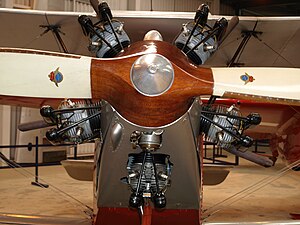Armstrong Siddeley Genet Major
| Genet Major/Civet | |
|---|---|
 | |
| Genet Major installed in a Southern Martlet at the Shuttleworth Collection | |
| Type | Radial aero engine |
| Manufacturer | Armstrong Siddeley |
| First run | 1928 |
Developed from | Armstrong Siddeley Genet |
The Armstrong Siddeley Genet Major is a British five-cylinder (later seven-cylinder), air-cooled, radial engine for aircraft, designed and built by Armstrong Siddeley and first run in 1928. It developed 140 horsepower (104 kW). In Royal Air Force use the seven-cylinder version was known as the Civet I. The Feliform names used are in line with company convention, the Genet and Civet[1] both being large cat-like carnivores.
Contents
1 Variants and applications
1.1 Genet Major I
1.2 Genet Major 1A (Civet I)
1.3 Genet Major III
1.4 Genet Major IV
2 Survivors
3 Engines on display
4 Specifications (Genet Major IA/Civet I)
4.1 General characteristics
4.2 Components
4.3 Performance
5 See also
6 References
6.1 Notes
6.2 Bibliography
Variants and applications
Genet Major I
The Genet Major 1 was a five-cylinder engine of 105 horsepower (78 kW) that was closely related to the Genet I but with increased bore and stroke.
- Avro Avian
- Avro 619
- Avro 624
- Avro 638 Club Cadet
- Cierva C.19 Autogiro
- Civilian Coupé
- Saro Cutty Sark
- Southern Martlet
- Westland IV
Genet Major 1A (Civet I)

Armstrong Siddeley Civet
The Genet Major 1A (or Civet I in RAF service) was a seven-cylinder development of the Genet Major I, nominally rated at 145 horsepower (108 kW).
- Avro Avian
- Avro Cadet
- Avro Rota
- Cierva C.30A Autogiro
RWD-6 (not specified 7-cylinder Genet Major sub-type)- Saro Cutty Sark
- SEA-1
- Westland Wessex
Genet Major III
As Genet Major IA but with cylinders using cast rocker boxes.
Genet Major IV
A geared propeller drive version of the Genet Major IA, 160 horsepower (120 kW).
- ANBO V
Survivors
An Armstrong Siddeley Genet Major powers Southern Martlet (G-AAYX) which is owned and operated by the Shuttleworth Collection at Old Warden and flies at home air displays throughout the summer months.[2]
Engines on display
- An Armstrong Siddeley Genet Major IA is on display at the Royal Air Force Museum Cosford.[3]
- An Armstrong Siddeley Genet Major IV can be seen in Polish Aviation Museum in Cracow.[4]
Aviation Heritage Museum (Western Australia)[5]
Specifications (Genet Major IA/Civet I)
Data from Lumsden[6]
General characteristics
Type: 7-cylinder single-row radial piston engine
Bore: 4.25 in (107.95 mm)
Stroke: 4.5 in (114.3 mm)
Displacement: 452.01 cu in (7.3 L)
Length: 38.8 in (985.5 mm)
Diameter: 38.15 in (970 mm)
Dry weight: 327 lb (148 kg)
Components
Valvetrain: Overhead poppet valves
Fuel type: 77 Octane petrol
Cooling system: Air-cooled
Reduction gear: Direct drive, Left hand tractor
Performance
Power output: 165 hp (123 kW) at 2,425 rpm at sea level
Compression ratio: 5:1
Power-to-weight ratio: 0.5 hp/lb
See also
Related development
- Armstrong Siddeley Genet
Comparable engines
- Warner Scarab
Related lists
- List of aircraft engines
References
| Wikimedia Commons has media related to Armstrong Siddeley Genet Major. |
Notes
^ Lumsden 2003, p.71.
^ The Shuttleworth Collection - Southern Martlet Retrieved: 21 November 2017
^ Royal Air Force Museum Cosford - Armstrong Siddeley Genet Major 1A 'Civet' www.rafmuseum.org.uk Retrieved: 1 January 2014
^ "Zbiory - silniki lotnicze". Muzeum Lotnictwa Polskiego (Polish Aviation Museum) (in Polish). Polish Aviation Museum..mw-parser-output cite.citation{font-style:inherit}.mw-parser-output q{quotes:"""""""'""'"}.mw-parser-output code.cs1-code{color:inherit;background:inherit;border:inherit;padding:inherit}.mw-parser-output .cs1-lock-free a{background:url("//upload.wikimedia.org/wikipedia/commons/thumb/6/65/Lock-green.svg/9px-Lock-green.svg.png")no-repeat;background-position:right .1em center}.mw-parser-output .cs1-lock-limited a,.mw-parser-output .cs1-lock-registration a{background:url("//upload.wikimedia.org/wikipedia/commons/thumb/d/d6/Lock-gray-alt-2.svg/9px-Lock-gray-alt-2.svg.png")no-repeat;background-position:right .1em center}.mw-parser-output .cs1-lock-subscription a{background:url("//upload.wikimedia.org/wikipedia/commons/thumb/a/aa/Lock-red-alt-2.svg/9px-Lock-red-alt-2.svg.png")no-repeat;background-position:right .1em center}.mw-parser-output .cs1-subscription,.mw-parser-output .cs1-registration{color:#555}.mw-parser-output .cs1-subscription span,.mw-parser-output .cs1-registration span{border-bottom:1px dotted;cursor:help}.mw-parser-output .cs1-hidden-error{display:none;font-size:100%}.mw-parser-output .cs1-visible-error{font-size:100%}.mw-parser-output .cs1-subscription,.mw-parser-output .cs1-registration,.mw-parser-output .cs1-format{font-size:95%}.mw-parser-output .cs1-kern-left,.mw-parser-output .cs1-kern-wl-left{padding-left:0.2em}.mw-parser-output .cs1-kern-right,.mw-parser-output .cs1-kern-wl-right{padding-right:0.2em}
^ Aviation Heritage Museum
^ Lumsden 2003, p.71
Bibliography
.mw-parser-output .refbegin{font-size:90%;margin-bottom:0.5em}.mw-parser-output .refbegin-hanging-indents>ul{list-style-type:none;margin-left:0}.mw-parser-output .refbegin-hanging-indents>ul>li,.mw-parser-output .refbegin-hanging-indents>dl>dd{margin-left:0;padding-left:3.2em;text-indent:-3.2em;list-style:none}.mw-parser-output .refbegin-100{font-size:100%}
Gunston, Bill (1986). World Encyclopedia of Aero Engines. Wellingborough: Patrick Stephens. p. 18.
- Lumsden, Alec. British Piston Engines and their Aircraft. Marlborough, Wiltshire: Airlife Publishing, 2003.
ISBN 1-85310-294-6.